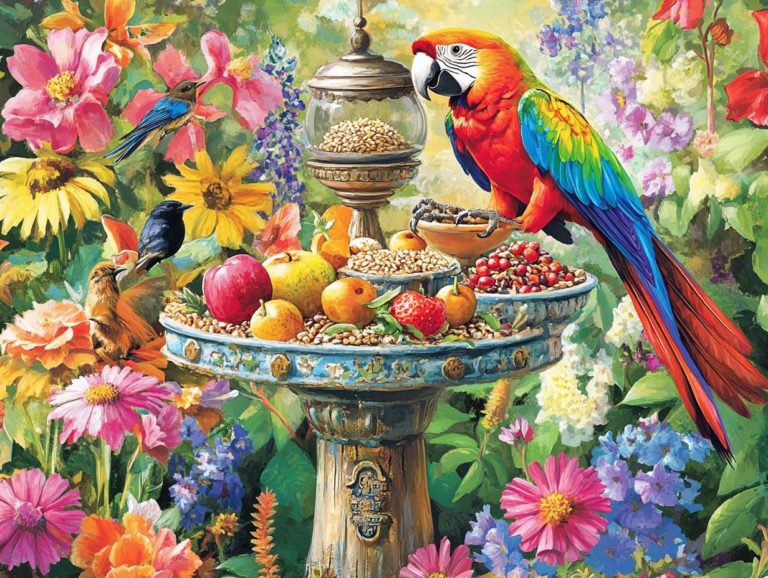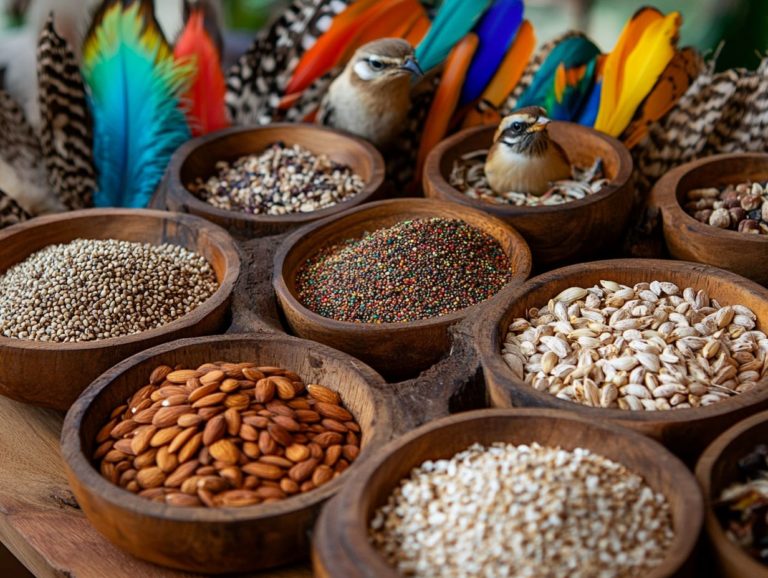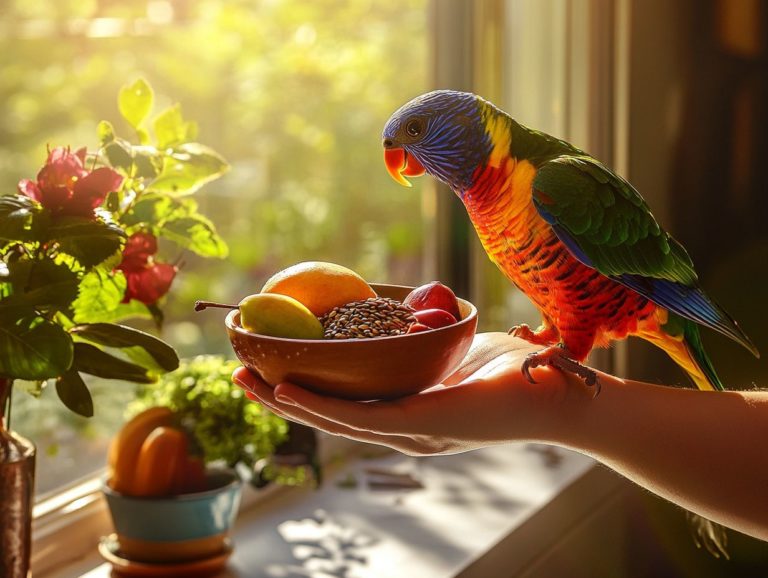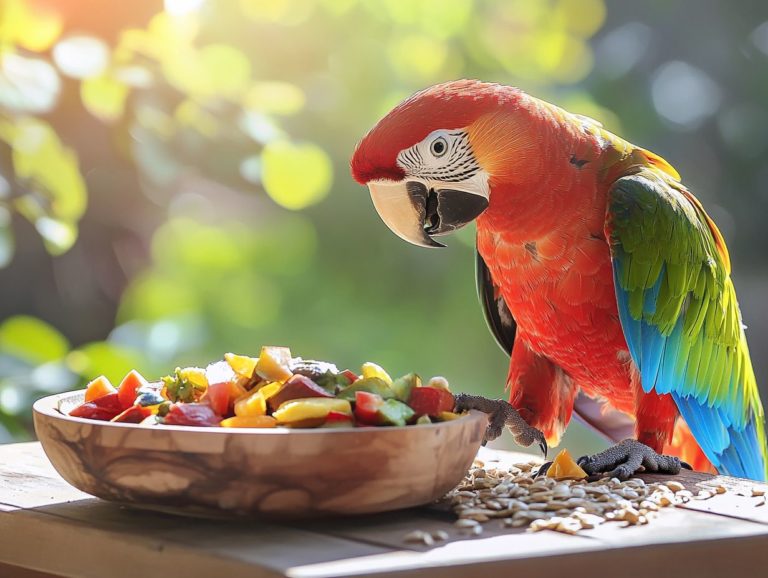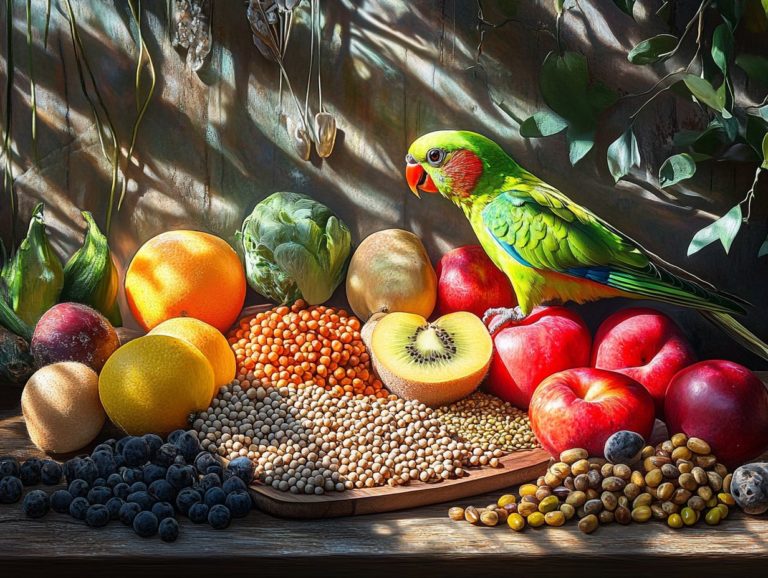Understanding the Nutritional Needs of Parrots
Is your parrot getting the nutrition it needs? Let’s dive into the best foods to keep them happy and healthy. Providing the right diet for your parrot is essential for its overall health and happiness. In this article, you’ll explore the vital dietary requirements for these vibrant birds, delving into the types of foods they need and the significance of maintaining a balanced diet.
You’ll discover the ideal feeding schedule, including how often to feed them and the appropriate portion sizes, along with effective ways to supplement their diet. The article also covers common nutrient shortages and special dietary considerations for breeding or aging parrots.
By the end, you’ll be equipped with the knowledge to ensure your feathered friend thrives!
Contents
Key Takeaways:
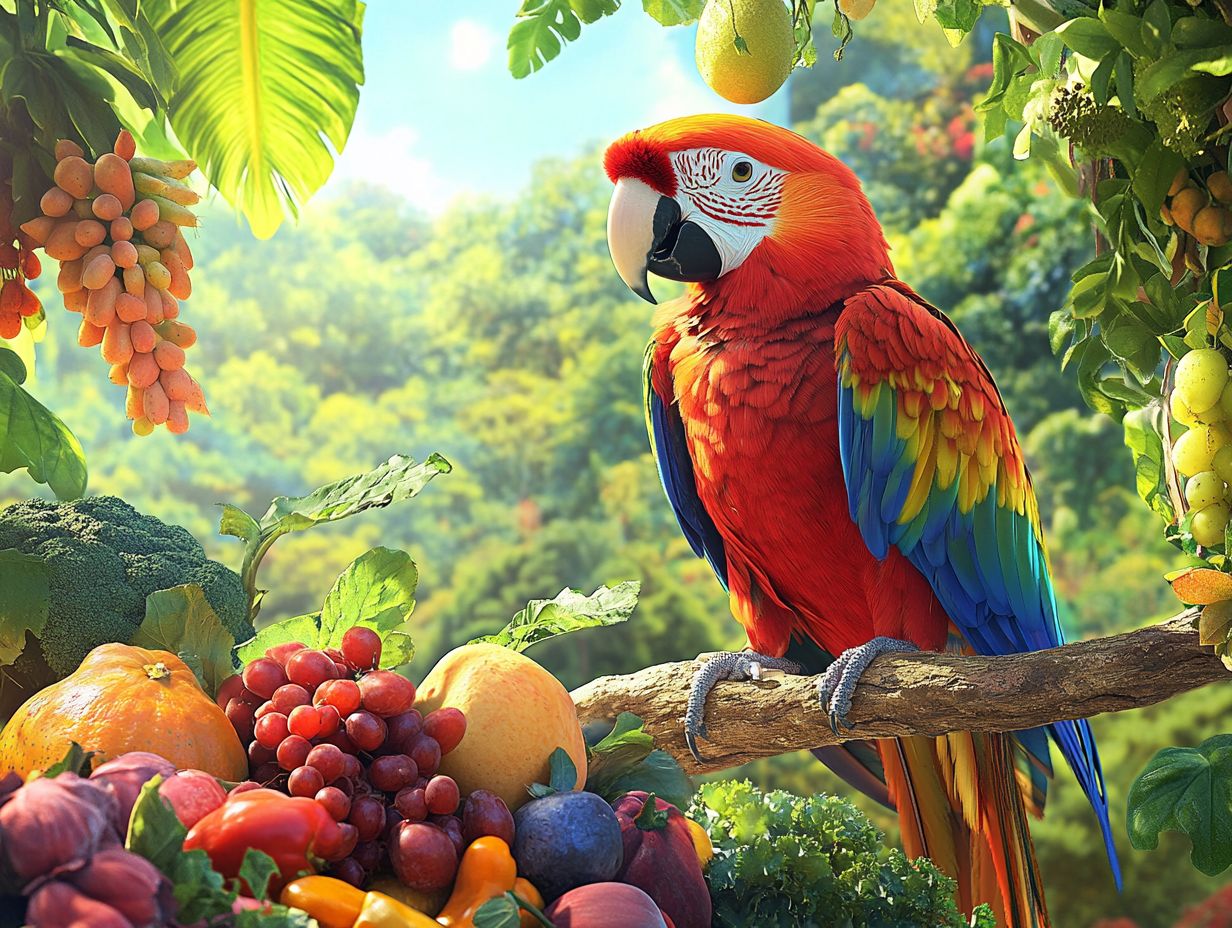
- Parrots need a varied diet that includes fresh fruits, vegetables, grains, and protein sources.
- A balanced diet is crucial for the long-term health and well-being of parrots, and should be adjusted according to their age and health conditions.
- Monitor their diet regularly to prevent serious health issues!
Dietary Requirements for Parrots
Understanding the dietary requirements for parrots is crucial for ensuring their well-being and longevity as cherished companions. Proper nutrition serves as the bedrock of a balanced diet that fulfills the specific needs of these vibrant creatures.
You ll want to include a diverse array of foods, encompassing essential vitamins, minerals, proteins, and other nutrients that support their overall health and help avert problems linked to a lack of important nutrients. It s important to tailor your feeding practices to the unique needs of each species, especially during exhibitions for pet birds, where their health and vitality are showcased for all to see.
Types of Food Parrots Need
Parrots thrive on a diverse diet that includes seeds, formulated foods, fruits, vegetables, grains, and legumes. Each food type is essential for meeting their nutritional needs and preventing potential health issues.
Incorporating formulated diets ensures that your parrot receives a balanced blend of nutrients tailored to its specific species. Seeds offer vital fats and proteins that fuel their energy levels. Fruits not only serve as delightful treats but also provide essential vitamins and hydration, boosting your bird s overall vitality.
Vegetables, especially dark leafy greens, are packed with crucial minerals and fiber that play a significant role in digestion. Grains and legumes are excellent carbohydrate sources, supporting their active lifestyles.
When choosing food for a parrot, particularly one that may participate in pet bird shows, it s important to consider the unique dietary requirements of different species. This careful selection keeps your parrot healthy and shows off its beautiful feathers.
Importance of a Balanced Diet
A balanced diet is absolutely crucial for the health of your parrot, ensuring they receive all the essential amino acids, vitamins, and minerals necessary for optimal nutrition. This balance not only maximizes nutrient absorption but also helps prevent health issues related to dietary deficiencies.
Aim for a diverse diet that comprises about 60% high-quality pellets, which lay the groundwork for their nutritional needs. Fresh fruits and vegetables should constitute around 30% of their intake, providing important antioxidants and fiber.
The remaining 10% can be reserved for healthy treats like nuts and seeds just remember to offer these in moderation to keep fat levels in check.
By sticking to these proportions, you can promote vibrant feathering, strengthen their immune system, and support overall vitality, significantly enhancing the quality of life for your feathered friend.
Feeding Schedule for Parrots
Establishing an effective feeding schedule for your parrots is essential for meeting their nutritional needs and ensuring they maintain optimal health. By understanding the frequency and portion sizes of their meals, you can significantly influence their growth, energy levels, and overall well-being.
Start today! Your parrot deserves the best diet for a vibrant life.
Frequency and Portion Sizes
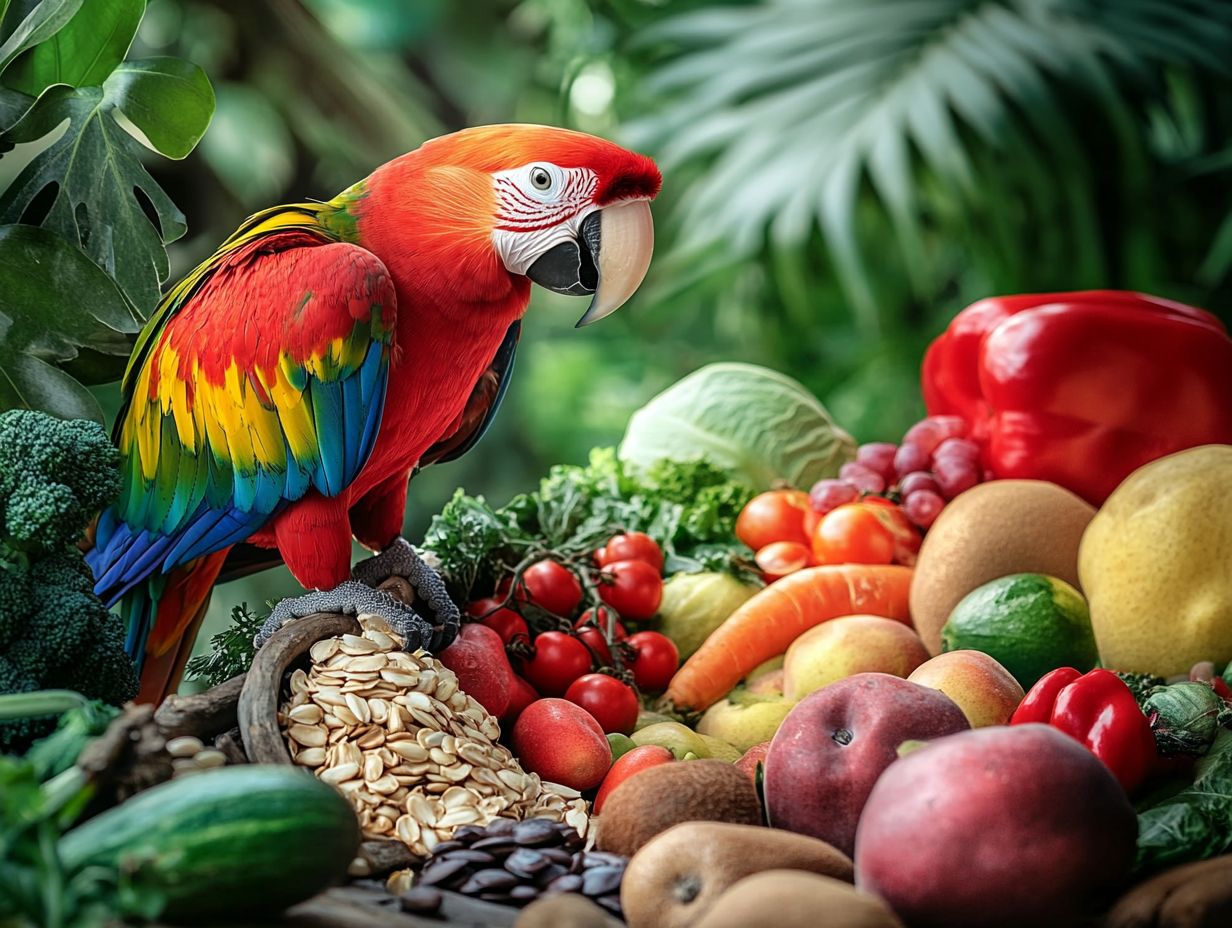
The frequency and portion sizes of meals are vital to your parrot’s feeding practices. They directly impact their nutritional needs and overall health. By following recommended guidelines, you can help prevent obesity and other health issues that stem from improper feeding.
For example, smaller species like budgerigars typically need to be fed twice a day. Portion sizes should fit comfortably in their petite beaks. In contrast, larger species, such as macaws, might thrive on a three-meal-a-day regimen, with each meal consisting of a more generous amount of food.
Regularly checking their weights is crucial. This allows you to adjust feeding schedules and portions as needed. Ensure that dietary changes align with their activity levels and growth stages. By adopting this attentive approach, you foster a balanced diet that promotes long-term health and vitality for your feathered companion.
Supplementing a Parrot’s Diet
Supplementing a parrot’s diet can be a helpful habit. It ensures they receive essential vitamins and minerals that might be lacking in their regular food. Nutritional supplements can significantly help in preventing health issues and enhancing overall well-being, allowing your feathered companion to thrive.
Types of Supplements and Their Benefits
There are many nutritional supplements available for your parrots, each packed with vitamins, minerals, and essential amino acids, which are the building blocks for proteins. These provide distinct health benefits. Understanding these supplements is vital for addressing any health concerns.
Take calcium supplements, for example; they are incredibly helpful for parrots that are laying eggs. They promote proper bone formation and egg health. Vitamin A is crucial for vibrant plumage and a strong immune system. Meanwhile, B vitamins are essential for energy metabolism and managing stress.
Incorporating these supplements into your parrot’s diet can be easy. You can mix powders into their regular food or offer chewable options as delightful treats. Ensuring a variety not only makes mealtime more appealing but also guarantees a comprehensive nutrient intake tailored specifically to their needs.
Common Nutritional Deficiencies in Parrots
Identifying common nutritional deficiencies in parrots is essential for maintaining their health and well-being. Certain deficiencies can lead to serious health issues.
Recognizing the signs and symptoms of these deficiencies empowers you to take timely action. This ensures your feathered friend receives the care they need in consultation with an avian veterinarian.
Signs and Symptoms of Deficiencies
Understanding the signs and symptoms of nutritional deficiencies in your parrot is crucial for ensuring early intervention and effective treatment. These indicators can manifest in various ways, often showing through changes in behavior, plumage, and overall health.
For instance, you might notice your parrot becoming unusually lethargic or, conversely, showing increased aggression when lacking essential vitamins or minerals. A dull or frayed feather appearance might suggest a deficiency in critical fatty acids or protein in their diet. Different species can exhibit deficiencies uniquely; for example, African greys may show respiratory issues due to a lack of Vitamin A, while budgerigars might suffer from calcium deficiencies affecting their reproductive health.
If you observe any of these signs, consulting with an avian veterinarian is essential for an accurate diagnosis and tailored dietary advice.
Addressing and Preventing Deficiencies
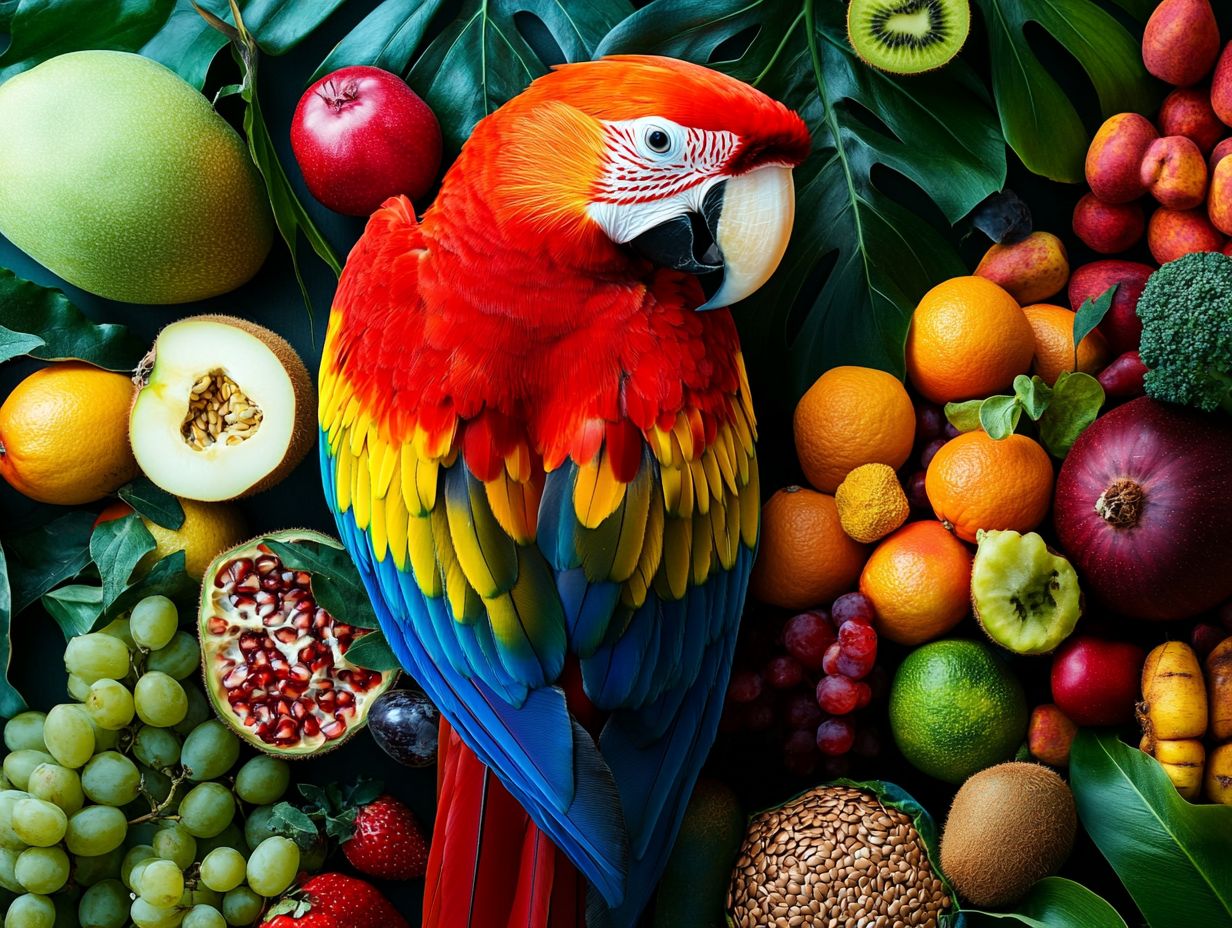
Addressing and preventing nutritional deficiencies in parrots requires active care in their dietary management. By meeting their nutritional needs through proper feeding practices, you can prevent serious health issues and keep your parrot thriving!
This means incorporating a variety of foods rich in essential nutrients, such as fresh fruits like papaya and berries. Also, include vegetables like spinach and carrots, which are packed with vital vitamins and minerals crucial for your parrot’s overall well-being. Exploring high-quality pellets that offer balanced nutrition can serve as a valuable complement to their diet. Don’t overlook the potential benefits of supplements, especially when certain nutrients are tougher to obtain from their regular meals.
Regular veterinary check-ups are essential for monitoring their health and nutritional status. This allows for timely interventions and adjustments as needed. Through thoughtful dietary planning and consistent care, you can foster a healthier, happier life for your feathered companions.
Special Dietary Considerations for Parrots and Pet Birds
Parrots require unique dietary considerations that you must address, particularly during breeding, aging, or when managing specific health conditions. Tailoring their nutrition to meet these special dietary needs is essential for their overall health and longevity, including ensuring they receive adequate vitamins and minerals in their diet.
Dietary Needs for Breeding and Aging Parrots
Breeding and aging parrots have distinct dietary needs that you must recognize to support their reproductive health and longevity. Ensuring they receive the appropriate nutrition during these life stages is crucial for preventing health problems.
For breeding parrots, a diet rich in proteins, vitamins, and minerals is essential to enhance fertility and support egg development. Increasing their intake of fresh fruits, vegetables, and high-quality pellets will help meet these heightened nutritional needs and contribute to a balanced diet.
As your parrots age, their metabolic rate the speed at which your parrot uses energy tends to decrease. This requires a gradual reduction in calories while emphasizing easily digestible foods and essential amino acids. Introducing antioxidant-rich ingredients can bolster their immune system, and paying attention to dental health by offering softer foods when necessary is equally important.
By tailoring their diet to these phases, including the use of dietary supplements, you pave the way for a healthier, more vibrant life for your feathered companions.
How to Adjust Your Parrot’s Diet for Health Issues
When your parrot faces health challenges, adjusting its diet becomes essential to cater to its specific nutritional needs and aid in recovery. Consulting with avian veterinarians can offer invaluable insights into the most effective dietary adjustments.
For example, if your parrot is struggling with obesity, it might thrive on a diet brimming with fresh vegetables like carrots and leafy greens, while cutting back on fatty seeds and nuts, including sunflower seeds. On the other hand, if your feathered friend is dealing with liver issues, it may need a low-fat, high-fiber menu filled with whole grains and legumes to support better liver function, along with a focus on nutrient absorption.
Don t overlook the importance of dietary supplements; for instance, probiotics can significantly enhance gut health during recovery. Understanding how to tailor your parrot’s diet based on its health condition is crucial, including the right feeding practices. Seeking the expertise of veterinary professionals will ensure you’re making the right choices for these important dietary changes.
Frequently Asked Questions
Check your parrot’s diet today to ensure they are getting all the nutrients they need!
What are the main nutritional needs of parrots?
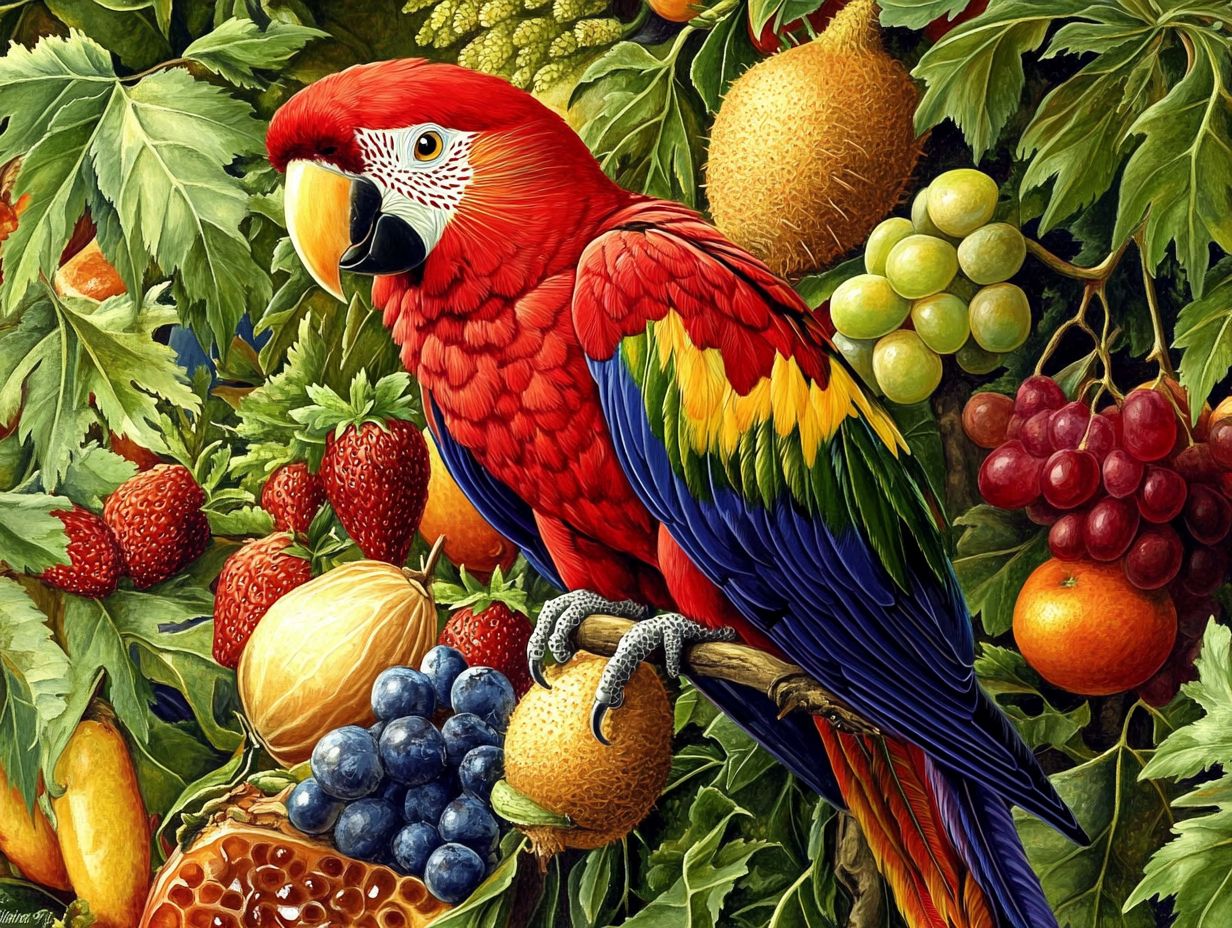
Parrots require a balanced diet that includes a variety of fresh fruits, vegetables, nuts, and high-quality pellets. Specifically formulated diets such as Zupreem and Harrisons are excellent options. They also need access to clean water at all times.
Why is it important to understand the nutritional needs of parrots?
Proper nutrition plays a critical role in a parrot’s health and well-being. Understanding these needs helps prevent health problems and promotes longevity.
Do all parrots have the same dietary requirements?
No, different species of parrots, such as Budgerigars, have varying dietary needs. Researching and understanding the specific nutritional requirements of your parrot species is essential.
Are there human foods safe for parrots?
Yes, some human foods can be safe for parrots, but they should be given in moderation. Stick to a diet formulated specifically for them and avoid foods that contribute to health problems caused by poor diet. Foods high in sugar, salt, or fat should be avoided. Safe options include cooked grains, certain fruits, and vegetables.
How often should I feed my parrot?
Parrots should have access to food throughout the day. Offer a variety of fresh fruits, vegetables, and pellets at least twice a day, with occasional treats in moderation.
What are the signs of a poor diet in parrots?
Signs of a poor diet include dull feathers, weight loss, an unkempt appearance, and changes in behavior. Keep a close eye on your parrot for signs of nutrient deficiencies! If you notice any of these signs, act fast and consult a veterinarian right away.
Conclusion
Proper nutrition is essential for your parrot’s health. Staying informed about their dietary needs ensures they receive the best care. Remember, a happy and healthy parrot is a well-fed parrot!


